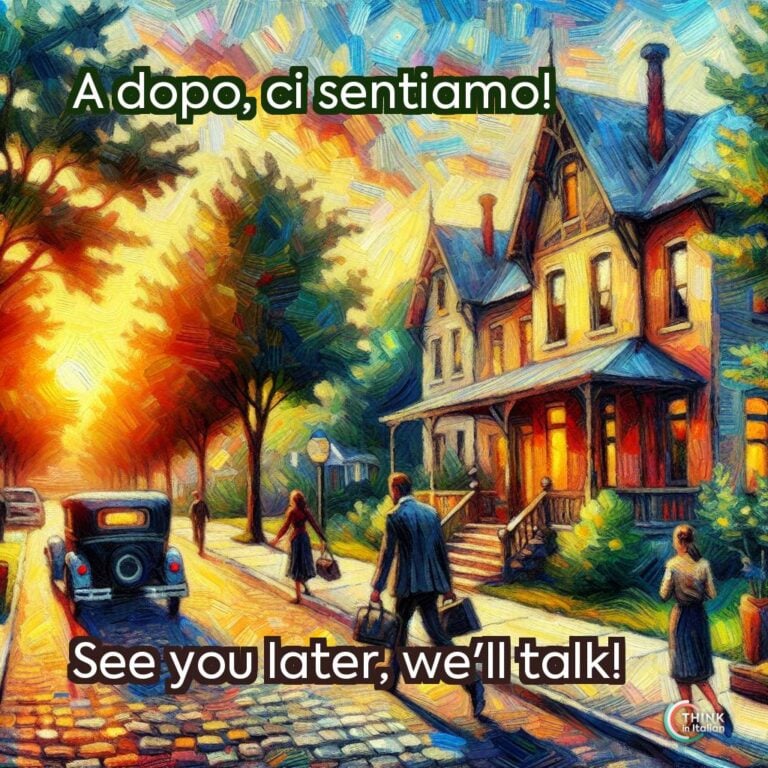How to Say Goodbye in Italian
Ciao
Ciao is the most informal and versatile way to say both “hello” and “goodbye” in Italian. It is commonly used among friends, family, or people within the same age group.
If you’re in a casual setting, especially with people you’re familiar with, ciao is always a safe choice. This word is particularly useful because it works in almost any casual context.
Ciao, ci vediamo domani!
Bye, see you tomorrow!
My advice is that, since it’s so informal, you should avoid using it in formal settings, like with your boss or in professional contexts.
Arrivederci
Arrivederci is a more formal way to say “goodbye” and is commonly used in polite or semi-formal settings. It’s perfect for situations where you want to show respect.
I really like its structure, because it is a sort of contracted form of a rivederci, literally “to when we see each other again”.
It is basically composed of the preposition a, the verb vedere (to see) and the reciprocal pronoun ci (us), together with the reiterative prefix ri-, used to convey the meaning of “again”.
Arrivederci, è stato un piacere conoscerti.
Goodbye, it was a pleasure to meet you.
For more formal occasions, such as addressing a superior or older person, I usually say arrivederla, which is a more respectful variation that makes use of the formal Lei as direct pronoun.
Addio
Addio is a dramatic and emotional way to say goodbye, reserved for situations where you don’t expect to see the person ever again.
The word addio comes from the phrase a Dio, which literally means “to God”. It was historically used as a farewell expression that implied entrusting the person to God’s care.
Today, it’s less common in everyday conversation but still used in literature and emotional farewells.
Addio, mio caro amico.
Farewell, my dear friend.
A Presto
A presto is a friendly and casual way to say “see you soon”, literally composed of the preposition a and the adverb presto (soon). It is perfect for when you expect to meet the person again in the near future.
A presto!
See you soon!
A Domani
When you know you’ll be seeing someone the next day, you can say a domani, which translates to “see you tomorrow”. This phrase is useful for both casual and professional settings when you’re confident about the next meeting.
A domani!
See you tomorrow!
As you might have understood already, as long as you use the preposition a followed by an adverb of time, you can tell your interlocutor you’re meeting somewhere in the future!
A domenica!
See you on Sunday!
Buona Giornata / Buona Serata
Sometimes, saying goodbye also involves wishing someone well for the rest of the day or evening. Buona giornata means “have a good day” and buona serata means “have a good evening”.
These two words never fail as part of my vocabulary, especially whenever I go somewhere where waiters are working, like a restaurant or a coffee shop, or also just a clothing shop.
Buona giornata!
Have a good day!
Buona serata!
Have a good evening!
Ci Vediamo
Ci vediamo is a casual and friendly way to say “see you” or “see you around”. It’s perfect for informal interactions with friends, colleagues, or family members.
It doesn’t specify exactly when you’ll meet again, which makes it versatile for general goodbyes.
Ci vediamo!
See you on!
Alla Prossima
Alla prossima is another informal way to say goodbye, meaning “until next time”. It’s commonly used when you don’t know exactly when you’ll meet the person again but you’re sure it will happen.
Whenever I hear this expression, I think of my dad. It is so versatile that he uses any time!
Alla prossima!
Until next time!
Context and Formality Matter
Italian offers a variety of ways to say goodbye, each suited for different situations, levels of formality, and relationships.
Each of these phrases has its place depending on the context and the level of formality required. For close friends or family, casual goodbyes like ciao or ci vediamo work well.
In professional or more formal settings, it’s better to use arrivederci or buona giornata. And when you want to signal a final goodbye, addio delivers a more emotional, lasting message.
For now, between me and you, a simple a presto works perfectly!






